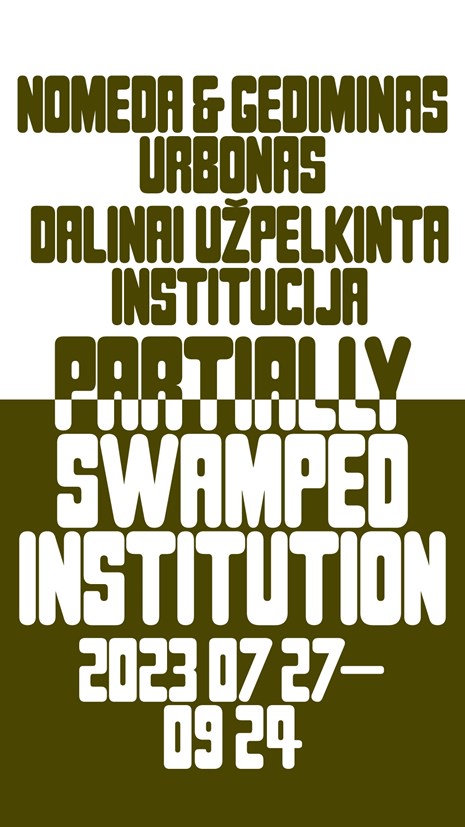Nomeda & Gediminas Urbonas

Nomeda & Gediminas Urbonas
Partially Swamped Institution
Across cultures and landscapes, the swamp spells crisis. It is bad nature that undoes the elementary order by mixing up soil, air, and water into a bottomless formlessness resistant to being mapped and depicted. Home only to vermin, nothing can be built or cultivated in its chaotic fecundity, which even threatens to make a mess of time itself by preserving the bodies and materials that come to rest there.
Embracing - and reversing - such negative mythologies of the natural world, Partially Swamped Institution sees hope and futurity in the swamp. The exhibition restages major works from the last decade by Nomeda and Gediminas Urbonas, including River Runs (2012), Mushroom Power Plant (2017), and The Psychotropic House: Zooetics Pavilion of Ballardian Technologies (2015-16). Archives of earlier projects are also presented, some of which date back to the time of transition following the fall of the iron curtain. From early feminist readings of the (post-)Soviet psyche to community-based activist art and assemblages of art and science, the exhibition traces the changing phases of the Urbonases' oeuvre. A regard for what we would today call environmental citizenship, however, has been a premise of their collaboration all along.
Characteristic of how the artists play with social forms and processes, Partially Swamped Institution is an exhibition that leaks agency and permits contingency. Straddling human and not-so-human bodies, it includes workshops, living entities, and robots - and in an extraordinary gesture, brings the swamp to the museum, as one has been constructed in the courtyard of the National Gallery of Art. This piece of live contraband tangles urban and natural ecologies, and invites the institution to act as a caregiver for a community of organisms that becomes both a device for action and a meditation on new forms of coexistence.
An off-site protagonist is a bog in southern Lithuania, Meškos Šikna - in English, the Bear's Ass. The Urbonases have foraged Meškos Šikna for imaginings to introduce in their museum swamp, and it will be the destination for field trips during the exhibition period. Besides that, it also carries a fitting toponym for countries that are the butt of imperialist expansion.
The exhibition's title evokes American artist Robert Smithson's Partially Buried Woodshed, a classic of land art that became an impromptu memorial for the students who were shot dead at its location by National Guard soldiers during anti-war protests in 1970.
Such intense points of confrontation suggest cultural and democratic institutions that are exposed and vulnerable, but also how ecosystems are - or ought to be considered as - political subjects. The swamp is a dynamic multiplicity of beings and materials, elements, and terrains that defies the division of the world into constructs of "nature" and "culture", offering an unexpected chance for new sense-making and for life to emerge out of chaos.
ARTWORKS IN THE EXHIBITION (pdf)
Exhibition organizer - National Gallery of Art of the Lithuanian National Museum of Art.
Curator Lars Bang Larsen
Exhibition architects: Jurga Daubaraitė, Jonas Žukauskas
Graphic designer NODE Berlin Oslo
Coordinators: Giedrius Gulbinas, Mindaugas Reklaitis, Aušra Trakšelytė
Exhibition collaborators: Adesola Akinleye, Vinzenz Aubry, Remigijus Daubaras, Antanas Gerlikas, Natalia Grom, Nicole L'Huilier, Terry T Kang, Simona Kačinskaitė, Laima Kristina Kazlauskienė, Jonas Kubilius, Kotryna Markevičiūtė, Beatričė Mockevičiūtė, Eglė Nedzinskaitė, Giedrius Pilkis, Gailė Pranckūnaitė, Tobias Putrih, Jan St. Werner, Austėja Tavoraitė, Indrė Umbrasaitė, Rytis Urbanskas, Gabrielė Urbonaitė, MIT Climate Visions.
Installation team: Leonas Abromaitis, Gediminas G. Akstinas, Audrius Antanavičius, Norbert Hinc, Andrius Ivanovas, Vidas Juršėnas, Vsevolod Kovalevskij, Almantas Lukoševičius, Tomas Orlovas, Jurgis Paškevičius, Dainius Markevičius, Andrius Melys, Vytautas Narbutas, Ilona Virzinkevič, Kazimieras Sližys, Vadim Šamrov, Mažvydas Truklickas
Copy editors: Alexandra Bondarev, Kristina Pilitauskienė, Kristupas Sabolius, Aušra Simanavičiūtė, Carolyn A. Shea
Acknowledgements to Juozas Augutis, Haozhen Feng, Augusta Fišerytė, Lolita Jablonskienė, Julija Kiršienė, Evaldas Makrickas, Barbara Lavrenova, Jūratė Sendžikaitė, Aistė Valiūtė ir Daumantas Plechavičius, Nerijus Zableckis, Arvydas Žalpys
Special thanks to Gintaras Rapkauskas
The project is financed by Lithuanian Culture
Council.
Partners: Vytauto Didžiojo universitetas, Vilniaus dailės akademija, Gamtos tyrimų centras, Pelkių atkūrimo ir apsaugos fondas, Lietuvos etnokosmologijos muziejus, Nacionalinis muziejus Lietuvos Didžiosios Kunigaikštystės valdovų
Media partners: LRT, Vilnius 700 metų jaunas
Sponsors: Telia, Durpeta, UPS, Exterus, Fundermax, Baloša


